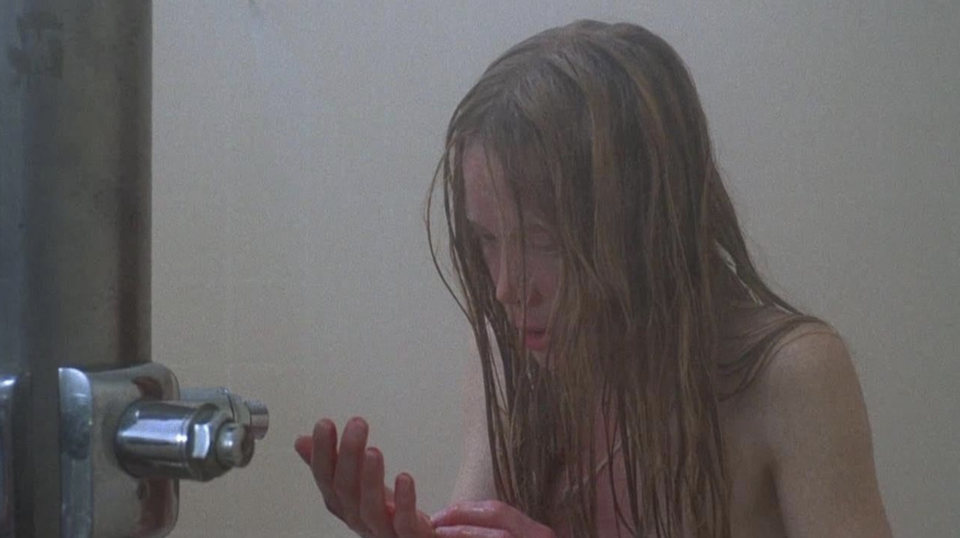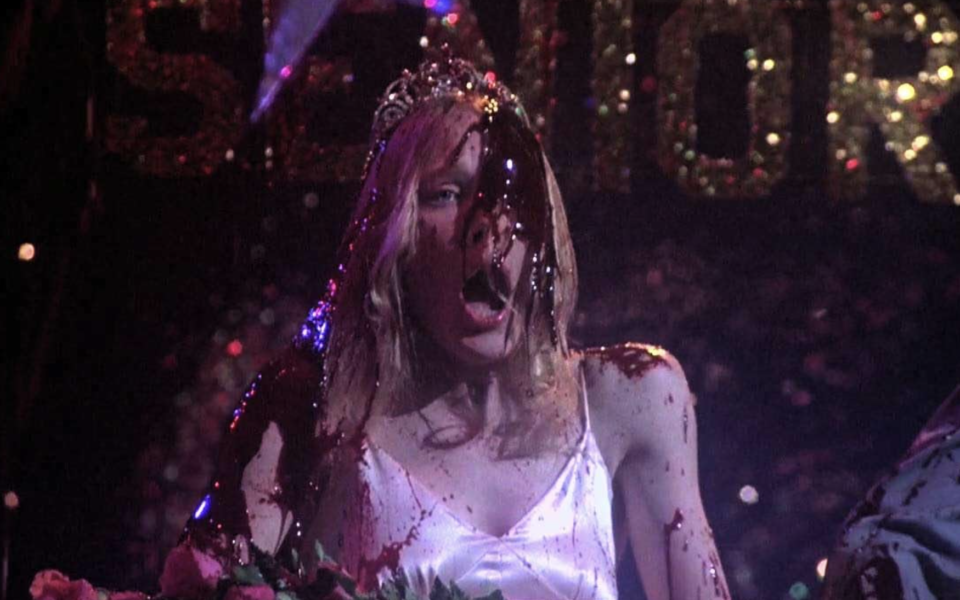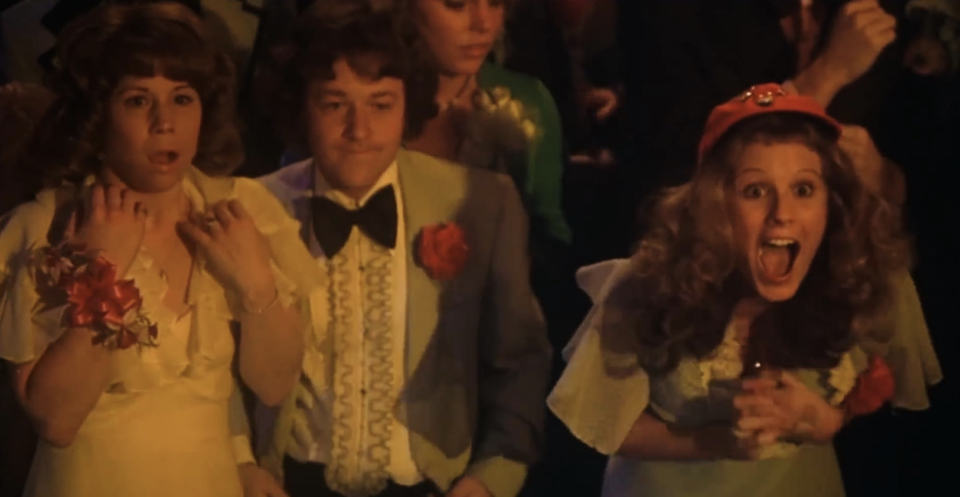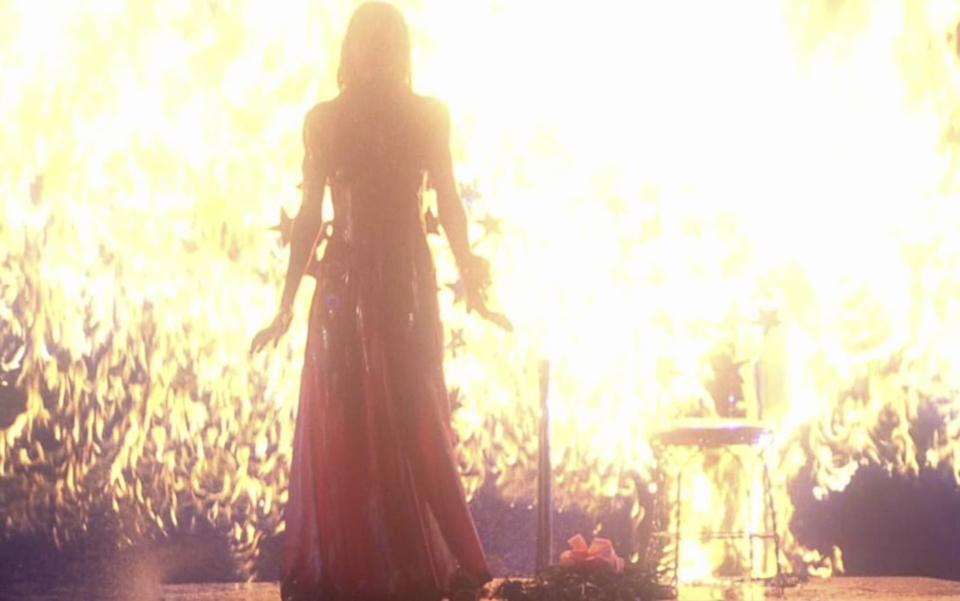Searching for Carrie White: Stephen King’s Most Complicated Female Killer [Fatal Femmes]

Every year around this time, millions of teens will push open battered double doors and enter the hallowed halls of high school. It’s no secret that the years spent completing grades 9-12 can be rough. But thankfully few will have so horrible an experience as Carrie White. The title character of Stephen King’s debut novel Carrie, this tortured teen is one of horror’s most complicated villains. Or is she a hero?
In addition to launching King into the stratosphere, Brian De Palma’s 1976 adaptation is a tale of horrific bullying and one woman’s desperate attempt to belong. Inspired by two girls from King’s own past, Carrie (Sissy Spacek) may be a killer–she’s certainly responsible for hundreds of deaths. She’s been called a monster and she may even be a witch. But it’s nearly impossible to watch the blood-soaked conclusion to her tragic story without finding at least something relatable in her lonely life.
Her Story

“Carrie White eats shit.” This shocking graffiti emblazoned on the walls of Bates High proclaims Carrie’s status as the school’s biggest loser. Without a single friend in the world, Carrie spends her days with her head down hoping to get through her classes without incident. De Palma shows us students teasing the poor girl during gym class, but King’s novel describes horrendous bullying dating all the way back to elementary school. Picking on Carrie is a pastime so ingrained in the Bates High culture that even the adults join in. A cruel English teacher callously mocks the quiet girl in front of the class when she dares to share her thoughts on a poem and the principal can’t even be bothered to learn her name.
Much of this othering stems from Carrie’s strict upbringing. The daughter of a religious zealot, her home life is filled with severe abuse. Margaret White (Piper Laurie) is a fundamentalist proselytizer who deems herself too pious for the local congregations. Hinting at her own traumatic past, Margaret views even the most mundane transgressions as mortal sins. She’s refrained from telling Carrie about menstruation to hopefully prevent her from committing the sin of womanhood. As a late bloomer with no friends, Carrie has somehow managed to make it all the way to her senior year without knowing what a period is.
When she notices blood on her thighs while taking a shower in the girl’s locker room she honestly believes she’s bleeding to death. As she begs for help, her classmates taunt her by throwing pads and tampons while shouting for her to “plug it up!” Mrs. Collins (Betty Buckley), the compassionate gym teacher, ultimately breaks up the incident and insists Carrie receive an early dismissal slip. The other girls carry on with their day but this shocking act of cruelty has set them on a deadly path of atonement for their years of heartless abuse.
Her Weapon

While Carrie cowers on the bathroom floor, strange things begin to happen. A ceiling light suddenly burns out and the principal’s ashtray flips over and shatters when he continues to call her by the wrong name. King’s novel provides a bit more information telling us that things like this tend to happen in Carrie’s presence. It seems Margaret’s daughter was born with telekinesis, an ability to move objects with her mind that serves as a defense mechanism in times of distress. The novel opens with a freak event from Carrie’s childhood. At just three years old, she brought massive stones raining down on the White house. We later find out Carrie inadvertently caused this destruction as a subconscious way of stopping her mother from gouging out her eyes. Now that Carrie has reached puberty, she’s become aware of this ability and has tentatively begun learning to control it.
As miserable as Carrie’s school day is, she gets no relief at home. Having received notification of the incident from the principal’s office, Margaret insists her daughter’s menstruation is God’s judgment and accuses her of moral weakness. She drags Carrie into her closet—a tiny pantry in the kitchen outfitted with an altar and a hideous statue of Jesus on the cross. Margaret locks Carrie in this closet to pray for hours though King reveals that she’s previously been imprisoned for days at a time.
With this awe-inspiring power comes a determination to stand up to her mother. A later scene at the dinner table shows Margaret turning on a dime to throw her drink in Carrie’s face as punishment for mentioning the prom. Drenched with tea but resilient, she refuses to be dragged back into the closet and mentally slams every window in the house. After a lifetime of abuse, Carrie has finally found a way to fight back.
Her Motive

Punishment for the locker room incident earns Carrie’s classmates a week of grueling physical detention. Mean girl Chris Hargensen (Nancy Allen) refuses to participate and finds herself banned from the upcoming prom while Sue Snell (Amy Irving) vows to make amends. In a misguided attempt at attrition, Sue convinces her boyfriend Tommy (William Katt) to ask Carrie to the prom in her place. After some cajoling (Tommy’s refusal to take no for an answer has aged poorly), Carrie accepts though this leads to a vicious fight with her mother.
With a hand-sewn dress and a bit of curl in her hair, Carrie arrives at the dance nervous, but excited for a magical evening. Unfortunately, Chris has a plan of her own. She’s arranged for Carrie to be voted prom queen and convinced her delinquent boyfriend Billy (John Travolta) to rig a bucket of pig’s blood to fall on her at the moment of coronation. As Carrie stands in front of her classmates dripping with blood, Margaret’s iconic prediction comes true: they all begin to laugh at her.
De Palma’s inventive framing of this pivotal scene paints a stark difference between Carrie’s perception of events and reality. When she arrives at the dance, most of the students treat her like one of their own. With Tommy as her date, they finally see her as a human being and the tide begins to turn on her status as an outcast. They honestly applaud her ascension as prom queen, believing they are part of a miraculous moment.
When the blood falls, nearly everyone in the auditorium is stunned. Only Norma (P.J. Soles), in on the prank, begins to laugh. The smug girl attempts to share her enjoyment of Carrie’s suffering with the student next to her, but he only shakes his head in disgust. When the bucket falls and hits Tommy moments later, another boy begins to laugh. However, everyone else in the auditorium still seems horrified by the awful prank unfolding before them.
De Palma then shifts the focus to Carrie’s point of view. The screen fractures into a horrific prism and she begins to hear voices from her past. The principal calls her Cassie over and over again while Mrs. Collins insists that she is trustworthy. The girls from the locker room return while Margaret White says over and over again, “They’re all going to laugh at you.” We watch Carrie’s distorted view of the horrified audience. She believes everyone is laughing at her, even the kind Mrs. Collins. Carrie’s mind has returned to other times of extreme trauma and she has lost track of reality. It’s impossible to tell what’s actually happening in the gym as Carrie reacts to not only the pig’s blood but a lifetime of torture that’s come before it.
Her Victims

After triggering the bucket of blood, Chris and Billy stumble, laughing, out of the auditorium. As Sue struggles to get back in, Carrie begins to mentally slam the doors shut. King explains that at first, she simply wants to punish the students in kind. She uses the fire hose to spray water on them, hoping to ruin their dresses the way they’ve ruined hers. Unfortunately, the hoses drench the stage, electrifying anyone touching the band’s sound equipment. This leads to a fire that will take the lives of students and teachers alike.
Though Carrie likely does not intend to kill anyone, she makes no effort to stop the carnage. She pummels Norma with the water hose’s powerful jet and bisects Mrs. Collins with a falling scoreboard. Carrie finds herself swept away by the intoxicating power of revenge. A lifetime of unexpressed fury begins to flow and she channels it all into a fiery rage. Chris and Billy watch in horror from outside the auditorium as their classmates burn. Finally opening the doors, Carrie tracks the cruel couple down and sends their car careening into a deadly crash.
In a daze, Carrie wanders out of the blazing gymnasium and walks back home. She trudges upstairs and begins to wash off the blood while Margaret hides in the shadows. All Carrie wants is comfort from her mother, but once again Margaret makes things worse. Convinced that her daughter is a witch, she has decided to murder Carrie. While holding the frightened teen and pretending to pray, Margaret plunges a long kitchen knife into Carrie’s back. It’s a horrific betrayal much worse than anything that’s happened at school. Carrie defends herself by using her talent to propel knives and other kitchen utensils through the air.
In a nearly perfect recreation of the statue from the torturous prayer closet, Margaret winds up pinned to the doorway of the kitchen. What begins as simple self-defense, becomes symbolic revenge for a lifetime of abuse. Horrified by what she’s done, Carrie pulls her mother back into the closet and clings to the corpse as the house collapses around her.
Her Legacy

Nearly 50 years since the novel’s publication, Carrie’s name has become synonymous with prom. King even references the story in his newest novel, Holly, when describing a more fortunate prom queen. But aside from casual references to pig’s blood and joking threats to burn it all down, Carrie’s story has a deeper legacy. King’s debut novel and De Palma’s iconic film have become cautionary tales showcasing the awful consequences of bullying and abuse. Carrie may be the story’s most dangerous character, but it’s impossible to engage with the story and not view Chris and Margaret as the greater villains. Carrie reminds us to be kind to others, even those we don’t understand. You never know what powers may be lurking behind the eyes of someone you’ve pushed too far.
It must be said that Margaret White is an equally complicated character. The monologue she delivers before attempting to murder her daughter reveals a deeply disturbed woman with a possible history of sexual assault. It’s likely that Margaret has filled her life with religious fervor to avoid dealing with trauma in her own adolescence. However, this does not excuse her actions. For all of Carrie’s destruction, she has succeeded in breaking a cycle of abuse dating back years before her birth.
But the most indelible piece of Carrie’s legacy is the desire for power bigger than yourself. A classic example of Good For Her Horror, Carrie finally finds a way to show the world how much she has been hurt. Victims of ongoing abuse learn to survive by making themselves small and compliant, hoping to avoid the pain they know is lurking just around the corner. Carrie has found a way to make herself strong. She no longer has to suffer the emotional pain of abuse alone. She has found a way to make her trauma real to everyone around. And she will force them to understand how they’ve made her feel.
Carrie is responsible for hundreds of deaths. She makes the choice to trap her classmates in the gym and she burns them alive, but one might argue that seventeen years of vicious torment is equally painful. Carrie has found a way to reflect back the brutality heaped on her since her birth and it turns out that no one can withstand the destructive power of this cruelty.
Categorized:Editorials

